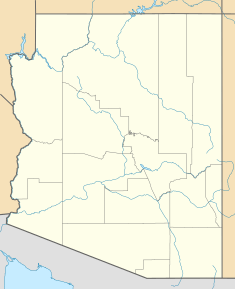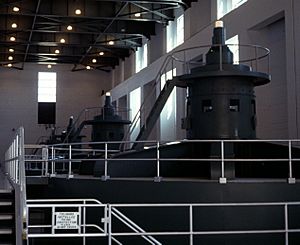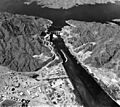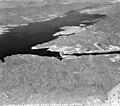Parker Dam facts for kids
Quick facts for kids Parker Dam |
|
|---|---|
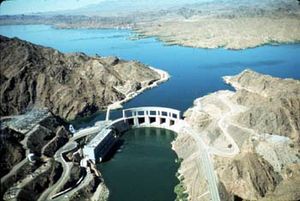 |
|
|
Location of Parker Dam in Arizona
|
|
| Location | San Bernardino County, California La Paz County, Arizona |
| Coordinates | 34°17′47″N 114°08′23″W / 34.29639°N 114.13972°W |
| Status | In use |
| Construction began | 1934 |
| Opening date | 1938 |
| Owner(s) | United States Bureau of Reclamation |
| Operator(s) | United States Bureau of Reclamation |
| Dam and spillways | |
| Type of dam | Concrete gravity-arch |
| Impounds | Colorado River |
| Height | 85 ft (26 m) |
| Height (foundation) | 320 ft (98 m) |
| Length | 856 ft (261 m) |
| Width (crest) | 39 ft (12 m) |
| Width (base) | 100 ft (30 m) |
| Spillway type | Service, controlled |
| Spillway capacity | 400,000 cu ft/s (11,000 m3/s) |
| Reservoir | |
| Creates | Lake Havasu |
| Total capacity | 646,200 acre⋅ft (797,100,000 m3) |
| Catchment area | 178,392 sq mi (462,030 km2) |
| Surface area | 19,300 acres (7,800 ha) |
| Power station | |
| Turbines | 4 x 30 MW Francis turbine |
| Installed capacity | 120 MW |
| Annual generation | 456.944 GWh |
The Parker Dam is a huge wall built across the Colorado River. It is a special type of dam called a concrete arch-gravity dam. Workers built it between 1934 and 1938. The dam is about 155 miles (249 km) downstream from the famous Hoover Dam.
What makes Parker Dam so unique? It is the deepest dam in the world! A large part of it, about 235 feet (72 meters), is hidden underground. This deep part was needed to reach strong rock for the dam's foundation. Only 85 feet (26 meters) of the dam stands above the ground. This means more of the dam is underground than above it.
The main jobs of Parker Dam are to create a large lake and to make hydroelectric power. The lake behind the dam is called Lake Havasu. It can hold a lot of water, about 647,000 acre-feet (798 million cubic meters). The dam sits right on the border between Arizona and California. It is located where the river flows between the Whipple Mountains in California and the Buckskin Mountains in Arizona.
Making Electricity at Parker Dam
The Parker Dam has a power plant that makes electricity. It uses four special machines called Francis turbines. Together, these turbines can produce 120 megawatts of power. Each turbine is very heavy, weighing about 60,000 pounds (27,216 kg).
The water falls about 72 feet (22 meters) to spin these turbines. This process is very efficient, turning 97 percent of the water's energy into electricity. Half of the electricity made here helps pump water to cities. The other half is sold to power companies in California, Arizona, and Nevada.
There is a rule about how much electricity the dam can make. The water level in Lake Havasu must stay between 440 and 450 feet (134 and 137 meters) above sea level. This is important for other water pumping stations to work correctly.
Providing Water to Communities
Parker Dam is very important for supplying water to many people. Lake Havasu is the starting point for the Colorado River Aqueduct. This aqueduct is like a giant pipeline. It carries water to almost all the cities in the greater Los Angeles, San Bernardino, and San Diego areas.
The Metropolitan Water District of Southern California runs this aqueduct. They paid for most of the dam's cost. However, the U.S. Bureau of Reclamation owns and operates the dam.
Lake Havasu also provides water for another big project, the Central Arizona Project Aqueduct (CAP). This project brings water to farms and cities in Arizona. It supplies water to large cities like Phoenix and Tucson.
Images for kids
 | James Van Der Zee |
 | Alma Thomas |
 | Ellis Wilson |
 | Margaret Taylor-Burroughs |


